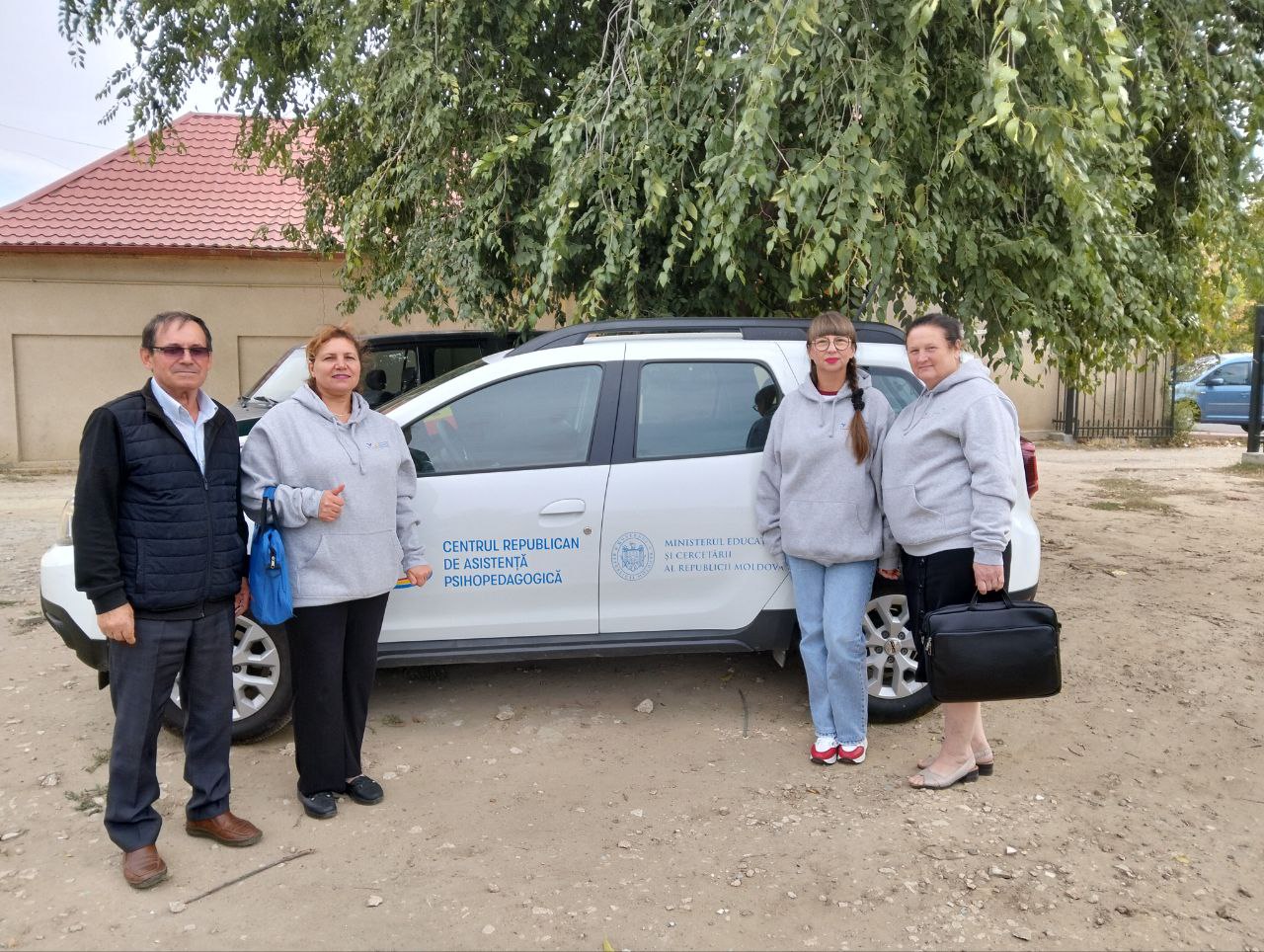
Mobile teams of specialists to support children with special educational needs in small rural schools
Children with special educational needs in rural areas will benefit from direct psycho-pedagogical support in the institutions where they learn. Each team includes a psychologist, psycho-pedagogue, and speech therapist, with the possibility of involving a pedagogue, and will operate in schools or spaces provided, with the model to be expanded nationally after testing.
The Ministry of Education and Research, in partnership with the Republican Center for Psycho-Pedagogical Assistance and UNICEF, has launched the first mobile intervention teams, currently in a piloting phase in the districts of Drochia, Soroca, and Cahul, until December 31, 2025.
"The mobile teams will bring psycho-pedagogical assistance services closer to children who need support, giving them the chance to learn, develop harmoniously, and realize their unique potential at their own pace and context. Through the activities of these teams, the Ministry of Education and Research aims to ensure equal access to quality education for all children," says Inga Grosu, the principal consultant within the Ministry of Education and Research.
Specialists will visit schools according to a set schedule, providing psychological, psycho-pedagogical, and speech therapy support to children, and counseling for parents regarding inclusion and child development. Moreover, the teams will help teachers enhance the competencies of students who need additional services.
"Educational inclusion means more than the physical integration of the child into the classroom; it means easy access to education, which is why support services are essential for students with special educational needs and their parents. Through the mobile teams, we offer specialized support directly on site so that children in small rural schools do not have to wait or travel long distances to receive the help they need," says Virginia Rusnac, director of the Republican Center for Psycho-Pedagogical Assistance.
According to UNICEF, the services will help prevent school dropout, early identification of developmental difficulties, and interventions in crisis situations, including cases of violence or psychological trauma. Support can be requested by schools, parents, local authorities, social service providers, or medical institutions.
"Mobile teams play a decisive role in preventing educational and social exclusion by early identification of development and learning difficulties, being an essential link between the child, family, school, and community," says Galina Bulat, Education Program Coordinator at UNICEF Moldova.
The initiative is part of Promoting quality education and lifelong learning opportunities for all program, implemented by UNICEF and UNDP, in partnership with the Ministry of Education and Research, with financial support from the European Union.
Environmental protection has become national priority - environment minister says
DOC // President appointed Alexandru Munteanu as candidate for Prime Minister
Speaker provided details on nomination process for Prime Minister candidate
Justice Minister's report: Over 400 extraditions completed and EU directives implemented in recent years
Acting justice minister: Judicial system reconfigured, over 100 new judges and 37 new prosecutors promoted
Minister of Justice presents activity report: Over 65% of 2020-2025 strategy actions accomplished
Nicolae Testemitanu Medical University of Moldova awards honorary title of Doctor Honoris Causa to professor, president of Romania's National Council of Rectors
Judges, prosecutors of Moldova trained in environmental cases' investigation
PHOTO GALLERY // Nicolae Testemitanu Medical University of Moldova marks eight decades of work
VIDEO // More people investigated for mercenary activities in Moldova; suspects allegedly joined paramilitary groups like 'Wagner'
Weekly payments collected via Single Euro Payments Area in Moldova increase by 186 per cent
AIS MOLDPRES and BTA enhance collaboration
Progress and new commitments in sanitary and phytosanitary sector discussed at Moldova–EU meeting
Mobile teams of specialists to support children with special educational needs in small rural schools
Moldovan president to participate in Paris Peace Forum, at invitation by President Emmanuel Macron
Water management, punishment of environmental infringements at center of discussions in 11 districts of Moldova
Women in of Transnistrian region inspired by technology: first edition of Tech Women Conference Tiraspol encourages digitalization
Nine students of Nicolae Testemitanu State medical University of Moldova awarded merit scholarships by state
Completion of negotiations with European Union by 2028 priority in new Moldovan cabinet's activity programme
Maintenance works carried out on main runway at Chisinau Airport: flights to be temporarily operated on alternative runway
Moldovan electricity market operator starts registration of participants in organized electricity markets
Moldova, Romania strengthen cooperation for regional development
European Commissioner for Financial Services and Savings and Investments Union to come to Chisinau
Scenarios of reuse of wastewater for irrigation to be developed in Causeni, Cantemir, Cahul settlements of Moldova
Protecting rights of citizens on left bank of Dniester and Bender municipality - major priority for Moldovan authorities

